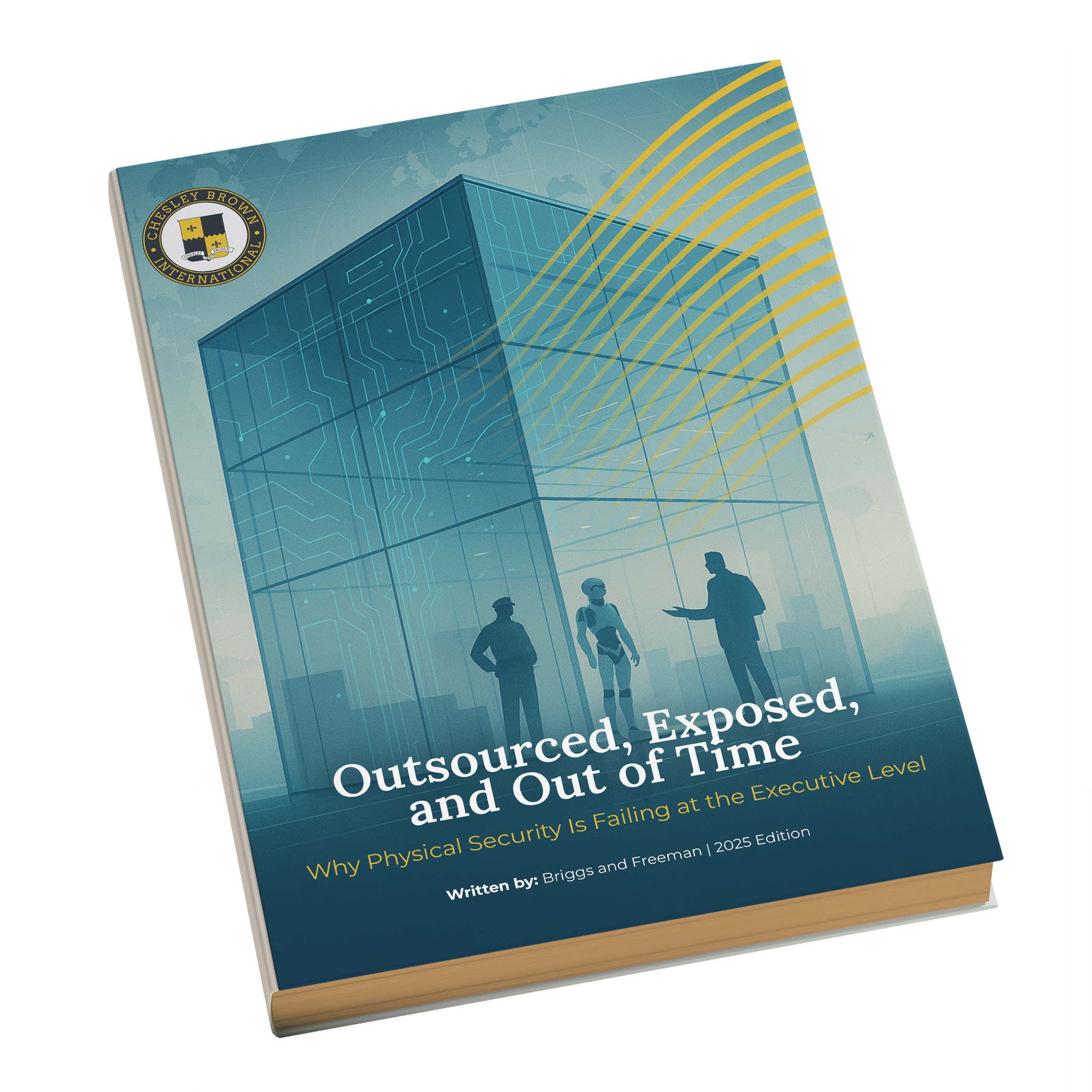The security services industry is one of the fastest growing industries in America today. With so many disruptive technologies, emerging threats, and the growing frequency of natural disasters, its easy to understand why — It can be exceedingly difficult to keep up with the myriad risks facing your organization. So how do you bring order to this chaos while still protecting your employees, assets, and livelihood? Hiring an advisor is one solution that many organizations overlook. Throughout our years of experience, we’ve noticed a lot of confusion about what a security risk firm actually does, and why businesses might benefit from talking to one. A quick Google search will reveal how little information there is on the subject, and that’s likely by design. We’ll try to demystify the world of security advisory services.
So let’s dive in.
There are a wide variety of security “consultancies,” who provide security assessments for just about any type of security need you can imagine. Many security consultants offer their clients risk assessments as part of their broader business model. While at times limited in their abilities, these consultants can provide invaluable intel into your own organization. Because of their narrow scope and field of expertise, some smaller consultants may cannot uncover the entirety of a company’s exposures. Additionally, you may require additional capabilities such as investigative work when they do find evidence of wrongdoing or vulnerabilities.
In particular, we have seen a rise in one-person “consultancies,” in recent years. While some of these companies are highly skilled, be wary of consultants who claim to be professionals with experience, but have never actually run a private security program, produced a budget, or operated from said budget. The biggest culprits being retired law enforcement personnel who have never worked in the private sector security and former security directors who may understand private security, but don’t have the business understanding required to optimize and maximize your security program and budget.
With any business partnership, it’s wise to vet new business partners or vendors. Security consultants are absolutely no different. In fact, it may be more important to vet security vendors – when lives and livelihoods are at stake, you simply can’t afford to have someone who is learning on the job. Be sure to ask any prospective partners to provide references and examples of similar security programs they have run or advised for. Be sure to review their insurance coverages and make sure they possess and maintain all the correct licenses.
It is imperative to partner with an advisor who’s approach to business is commensurate with your philosophy. A good advisor can also have a transformational effect on your organization when done right
Consolidation Forces Organizations to Rethink Their Risk Management Programs
While traditional “security management,” companies handle the day-to-day operations, recruiting/hiring, and often help streamline the security requirements for your organization, there has been widespread consolidation among the biggest brands over the years. This shift has caused many organizations to look elsewhere for the dedicated service and responsiveness their customers and staff require. These one-size-fit-all solutions will often fill the role of a facilities staffing agency, dividing their focus between janitorial, guard services, and housekeeping services. These solutions generally do not recognize the individuality of their clients.
The largest of these conglomerates are often slow to respond, unable to act as quickly as some of their smaller rivals. While they often offer a more budget-friendly solution, they often lack access to high quality training. Their reduced pay rates mean the quality of officer and level of customer service suffers. They also lack the oversight required to protect and represent your brand’s reputation adequately. Often, by their very size and nature, create employee challenges of their own.
Regardless of the size of your business, your requirements can expose challenges that need to be addressed. Either way you choose, you need to be sure that your security partner offers the proper additional services to help you investigate, implement and oversee your risk management strategy to ensure the continued safety of your facility and team. It’s invaluable to have a team of experts in your corner when things go wrong.
When considering the risk management needs of your organization, it is important to determine the necessary level of spend. What risks are most likely to affect you or your staff? Will you need different levels of protection for different areas of your facility? Will your security team interact with the public? Will they have access to your networks? How do these vendors screen their employees? Will their team have access to proprietary or otherwise sensitive data? How will you protect intellectual property?
These are all considerations an organization must make before turning a security company and their officers loose on property.
Assessing Physical Security
To do this, choose a company that will assess your security needs before making recommendations. By doing so, they will provide you with a physical security assessment that will give you a complete understanding of what you need to do to improve the safety of your facility, and the current dangers you face.
Fortunately, almost every security risk firm will offer risk assessments to their clients. This can be very useful because you can have a fair idea of the problems you face along with solutions. Another thing you should consider when looking for security services assessments is the type of consulting services these companies provide. While some security consultants provide comprehensive assessments, others can only provide training. Prioritize what’s most important to your organization and select a team that can address your unique challenges.
In the end, it is important to find a security risk firm that provides a full range of services from risk advisory and investigation to managed physical security. In this way, you can get a complete evaluation that includes training on safety requirements and remediation techniques to protect your property.
In addition, when it comes to risk mitigation, size does matter to a degree. A smaller mom and pop security risk firm likely wouldn’t have the financial means, or experience to navigate an international trade dispute, for example. Likewise, the largest companies are unlikely to prioritize the design of bespoke requirements or to ensure the compliance of those programs over time.
In Summary
By choosing a security consultant with great bench strength, a broad network of resources, and access to the latest technology, you can be confident that you get the best results that addresses every part of your unique risk landscape. Before engaging a security risk firm to protect your business, you should consider your company’s needs and your current posture, which can help you choose the best security advisor to protect your location and allow you to get back to running your company. The world is a dynamic place, and one of the most dangerous things a company can do is say “this is how we’ve always done it.”
Protection requires a lot more than a guard on post and training. It requires a culture of forward-thinking and innovation. If you have concerns that keep you up at night, our experts are here to help. For over 30 years we’ve helped businesses anticipate and navigate risk before it becomes a crisis. If you would like to learn more about how our experts can help you protect what matters most, let’s talk.
Additional Resources
Sign up!
For industry-leading guides and analysis sign up for our blog below.
Latest News
Preventing Civil Unrest
We’ve all recoiled in disbelief and horror as we watched scenes of violence stream across our TVs. The violent insurrection we saw in the U.S. capitol was unprecedented. That is to say nothing of the …
What Achilles can Teach us About Threat Management
By: Dell Spry There are numerous similar, seemingly inconsequential, soft targets scattered across our country unprotected by a single surveillance camera or even a strand of barbed wire. Is this issue getting the attention it…
The SolarWinds Supply Chain Attack: What Businesses Need to Know
What is the SolarWinds Supply Chain Attack? SolarWinds, the Austin-based cybersecurity firm, found itself in the middle of a catastrophe due to internal security lapses. The firm recently earned headlines for making it to the…
Lessons Businesses Must Learn from the Nashville Bombing
The sound of gunfire punctuated the peaceful hush of Christmas morning. According to one witness, “It sounded like an automatic weapon.” About 10 minutes later she heard a second round of gunfire, then a third.…
3 Simple Practices to Optimize School Safety During Covid-19
Maximizing safety for students and employees If you’re anything like me, keeping your family safe is your number one priority. During the Covid-19 pandemic, this means minimizing social contact to reduce the chances of infection. …







